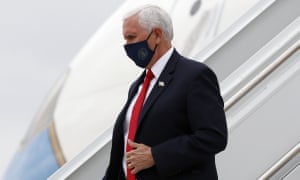‘Masks are incredibly important’ to avoid airborne transmission of coronavirus, but a third of Americans say they sometimes or never wear them

Photograph: Tony Gutierrez/AP
A cultural shift among Americans to adopt mass mask wearing would be one of the simplest and most effective ways to curb further devastation from the coronavirus pandemic, according to public health experts.
New Covid-19 infections are surging across much of the US, with 2.6 million people now confirmed to have had the virus.
The true figure of infection is probably much higher, at around 20 million, with Anne Schuchat, principal deputy director of the Centers for Disease Control and Prevention (CDC), warning on Monday that “we have way too much virus across the country for that right now” and that it was “wishful thinking” to expect the pandemic to peter out over the summer.
States that reopened businesses early when case numbers were relatively low, such as Texas and Florida, have been forced to reimpose restrictions on bars and restaurants to slow a huge spike in infections. Such seesawing lockdowns could be largely avoided, experts say, if Americans embraced near-universal mask wearing.
More than 30,000 deaths could be avoided by October if 95% of Americans wear face masks in public, according to research by the University of Washington. Even homemade masks act as a barrier to potentially infected droplets that are expelled when people cough, talk or breathe.
“Masks are incredibly important,” said Krystal Pollitt, an assistant professor at the Yale School of Public Health. “The airborne transmission of the virus is increasingly of concern and masks are an effective way to prevent that. The more we learn about this virus, the more I’m encouraging people to wear masks.”
Pollitt said she had had a positive response from schools in Connecticut to her urgings to wear masks but added “definitely a cultural shift” was needed for Americans to fully embrace them.
A third of Americans say they only sometimes or never wear a mask when in stores or other businesses, with strong partisan and racial divides: white people and Republicans are far less likely to wear masks than Democrats and black, Latino and Asian people.
This is in stark difference to countries such as South Korea and Taiwan, which managed to avoid economically harmful lockdowns due, in part, to a willingness to wear masks.
Hong Kong, with 7.5 million people, is a densely populated place that experienced huge numbers of travelers from mainland China, where Covid-19 originated, before border restrictions were put in place on 30 January. Only six coronavirus deaths have been recorded there.
This is due to a 97% rate of mask wearing, according to Yuen Kwok-Yung, a leading coronavirus expert who advises the Hong Kong government and who said the 3% who don’t comply are mainly Americans and Europeans.
“The only thing you can do is universal masking, that’s what stopped it,” he told the Wall Street Journal.
In the US, the CDC initially advised healthy people against wearing a mask, a stance driven by concerns over shortages of the N95 respirators.
“At that time, there was a paucity of equipment that our healthcare providers needed, who put themselves daily in harm’s way of taking care of people who are ill,” Dr Anthony Fauci, the federal government’s top infectious disease expert, told Congress last week.
As more was learned about the virus, however, it became clear that not only is it at least twice as infectious as the common flu but it can also be spread by people who are asymptomatic. The CDC now advises people to wear a mask in public, with at least 16 states and the District of Columbia mandating their use.
Mass adoption of mask wearing has been undermined, however, by Donald Trump’s insistence on not wearing one in public, even removing a mask during a factory tour so the media wouldn’t picture him in it. On Tuesday, the Fox & Friends host Steve Doocey sought to convince the Republican National Committee chair, Ronna McDaniel, and House minority leader, Kevin McCarthy, that Trump should cover up, and thereby show supporters “Masks are Great Again”. Neither seemed convinced.
Mike Pence has also declined to wear a mask, even during hospital visits, as well as during a press conference last week where the vice-president hailed the “truly remarkable progress” of the US as it approached 130,000 deaths from Covid-19.
The parlous situation in the US could have been headed off had there been an early, strong push towards mask wearing, experts say.
“Trump could’ve worn a mask for four weeks, asked people on the other side of the aisle to do the same and you’d get a dramatic reduction in the infection rate and start to operate very close to normal again,” said Andy Slavitt, the former head of Medicare and Medicaid during Barack Obama’s administration. “He can’t do the little bit of sacrifice to see it through.”
Instead, mask wearing has become, in some quarters, another cultural battleground in the US. In Palm Beach county in Florida, which is now fining people $250 for not wearing a mask, a public feedback forum last week featured residents falsely claiming that masks kill people, that they impede “God’s wonderful breathing system” and that they are a politically motivated tool designed to kill off freedoms.
Source: US Politics - theguardian.com



